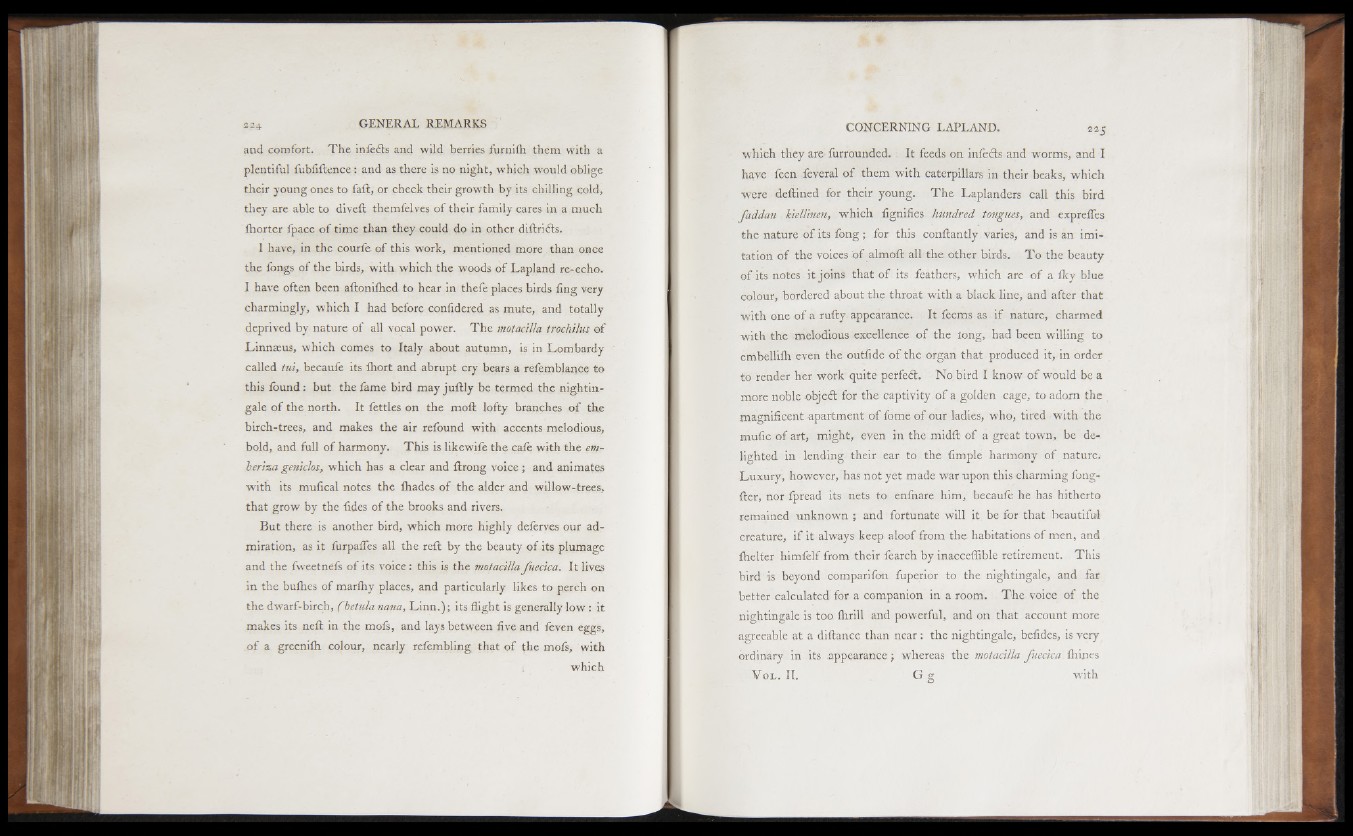
and comfort. The infeds and wild berries furnilh them with a
plentiful fubfiftence : and as there is no night, which would oblige
their young ones to fail, or check their growth by its chilling cold,
they are able to diveil themfelves of their family cares in a much
lhorter fpace of time than they could do in other diftrids.
1 have, in the courfe of this work, mentioned more than once
the fongs of the birds, with which the woods o f Lapland re-echo.
I have often been afloniihed to hear in thefe places birds iing very
charmingly, which I had before confidered as mute, and totally
deprived by nature of all vocal power. The motacilla trochilus of
Linnaeus, which comes to Italy about autumn, is in Lombardy
called tut, becaufe its ihort and abrupt cry bears a reiemblance to
this found : but the fame bird may juitly be termed the nightingale
of the north. It fettles on the moil lofty branches of the
birch-trees, and makes the air refound with accents melodious,
bold, and full of harmony. This is likewifo the cafo with the ember
iza geniclos, which has a clear and ilrong voice; and animates
with its muiical notes the ihades of the alder and willow-trees,
that grow by the lides of the brooks and rivers.
But there is another bird, which more highly deferves our admiration,
as it iurpafles all the reft by the beauty of its plumage
and the fweetnels of its voice : this is the motacilla fuecica. It lives
in the buihes of marihy places, and particularly likes to perch on
the dwarf-birch, ( betula nana, Linn.); its flight is generally low : it
makes its neft in the mofs, and lays between five and foven eggs,
of a greenifh colour, nearly refembling that of the mofs, with
which
which they are furrounded. It feeds on infeds and worms, and I
have feen feveral of them with caterpillars in their beaks, which
were deftined for their young. T h e Laplanders call this bird
faddan kiellinen, which fignifies hundred tongues, and exprefles
the nature of its fong ; for this conllantly varies, and is an imitation
of the voices o f almoft all the other birds. T o the beauty
of its notes it joins that of its feathers, which are of a iky blue
colour, bordered about the throat with a black line, and after that
with one o f a rufty appearance. It feems as if nature, charmed
with the melodious excellence of the long, had been willing to
embellilh even the outfide o f the organ that produced it, in order
to render her work quite perfed. No bird I know o f would be a
more noble objed for the captivity of a golden cage, to adorn the
magnificent apartment o f fome of our ladies, who, tired with the
mufic of art, might, even in the midft o f a great town, be delighted
in lending their ear to the fimple harmony of nature.
Luxury, however, has not yet made war upon this charming fong-
fter, nor ipread its nets to eninare him, becaufe he has hitherto
remained unknown ; and fortunate will it be for that beautiful
creature, if it always keep aloof from the habitations of men, and
fhelter himfelf from their fearch by inacceflible retirement. This
bird is beyond comparifon fuperior to the nightingale, and far
better calculated for a companion in a room. The voice of the
nightingale is too ihrill and powerful, and on that account more
agreeable at a diftance than near : the nightingale, befides, is very
ordinary in its appearance; whereas the motacilla fuecica ihines
V o l . II. G g with